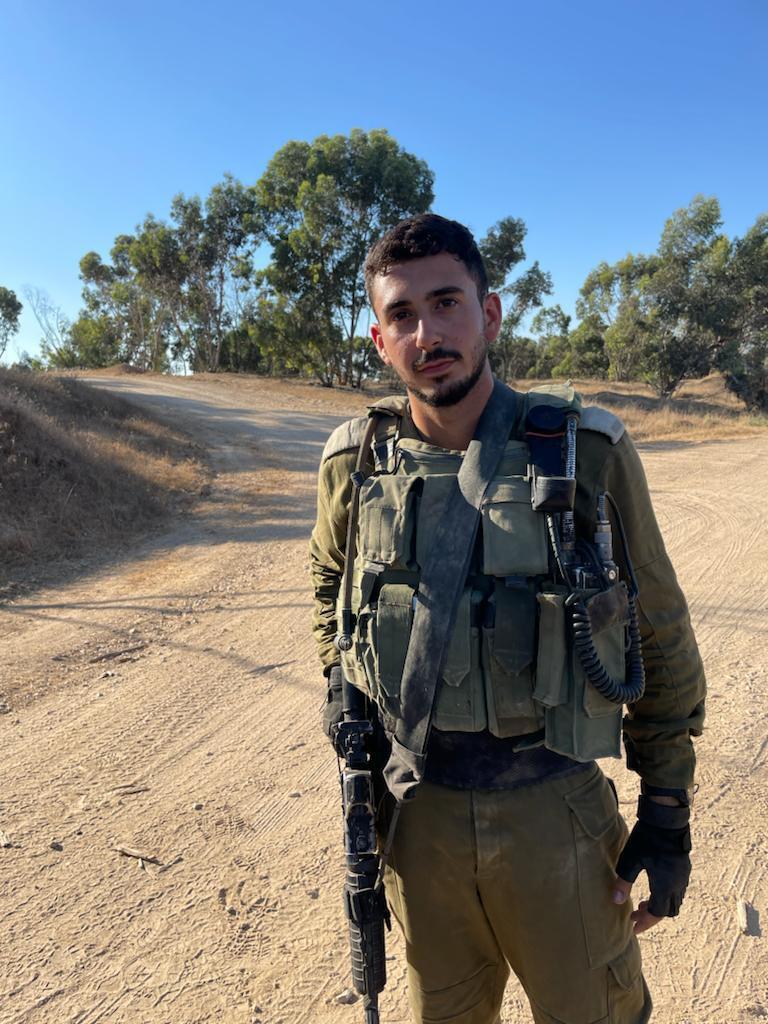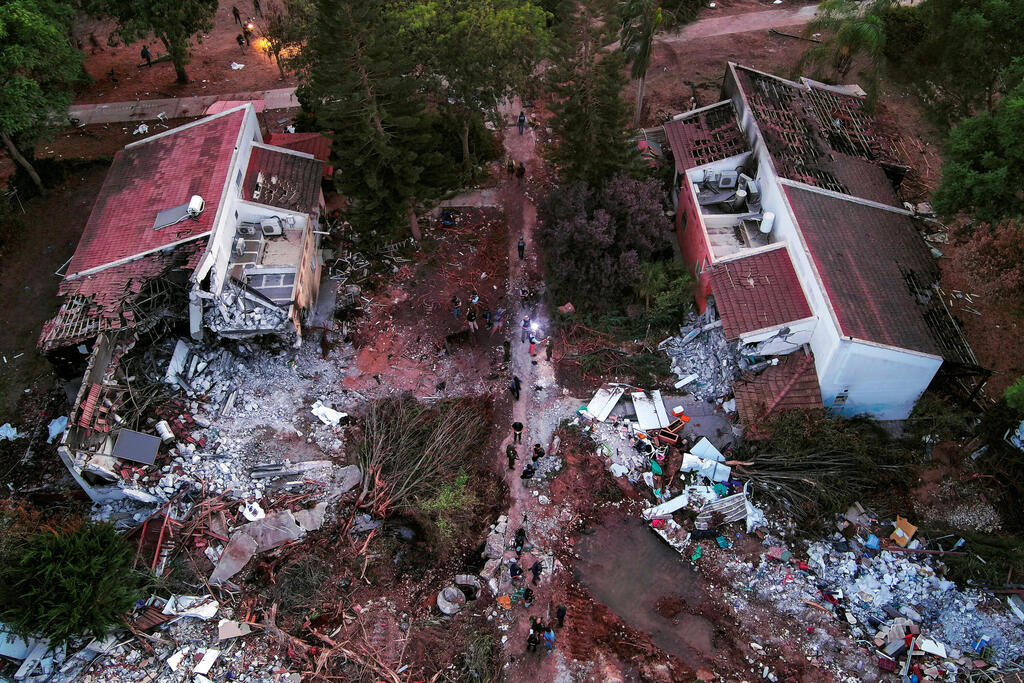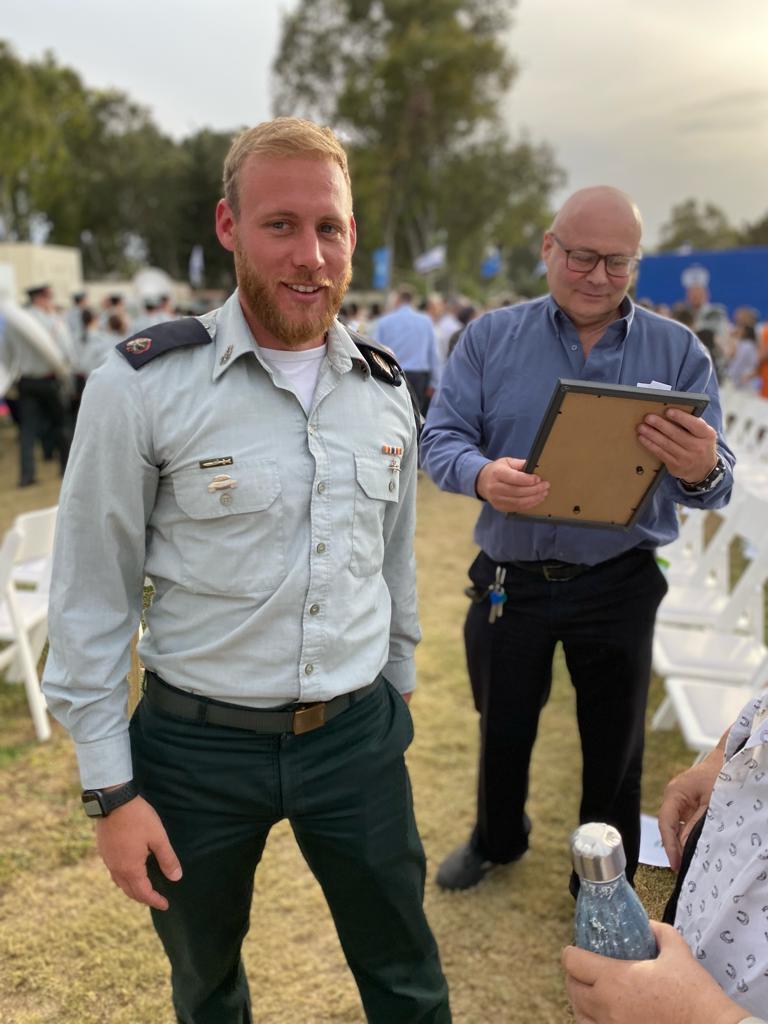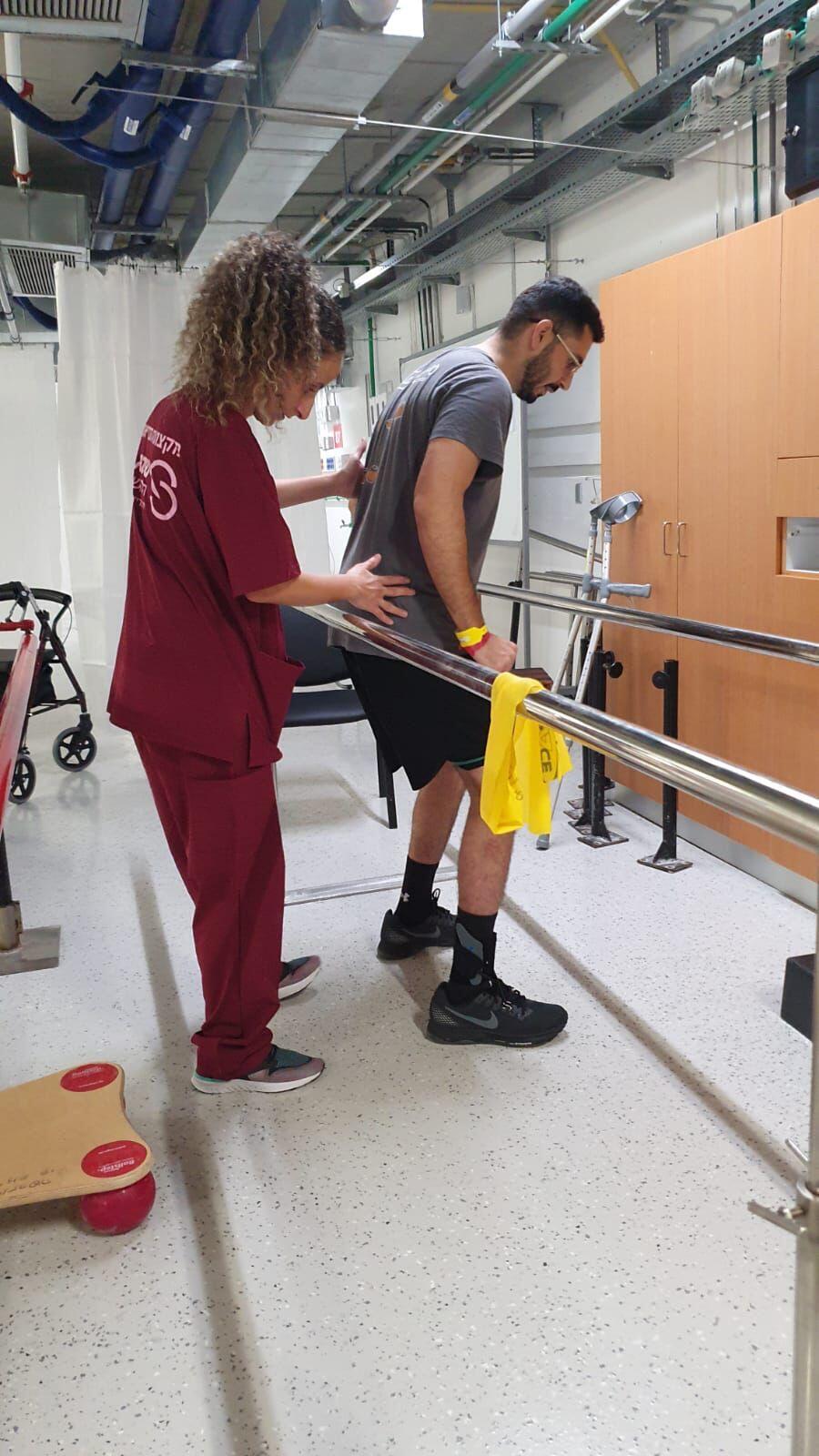October 7th caught Lt. Shaked, 22, a trainee at the IDF’s Tactical Command College at his parent’s home. The moment the sirens went off, Shaked, an Armored Corps officer in the 7th Brigade, realized this time it was different and that he had to join the fighting.
Read more:
“I know the sector. I’d served there for several months.” Shaked recalls the thoughts going through his mind as the sirens went that Saturday morning. “At first, I thought it was shooting by Palestinian good-for-nothings like you usually get in the area, but when my brother, who’s also an Armored Corps officer, showed me a video clip of a pick-up truck inside Sderot with terrorists shooting at a police car, I realized this was a whole different kind of situation. “
In a split-second decision, he donned his uniform. “My mother insisted on ironing my fatigues, like that would help” he smiles. He drove to the apartment he was renting in Herzliya to take his pistol and his bag that’s always ready, along with an old helmet and a bulletproof vest. “I messaged every Operations Staff officer in the brigade, telling them that whoever needed me – I was available and ready.”
I realized I had to join a force in the field rather than go there on my own with two of my magazines. I got to the emergency storage unit where they recruited the brigade’s reserves units. I signed out a machine gun - no ceramic vest, no night vision no equipment - actually almost nothing at all, and I joined the 7th Brigade’s deputy commander. In a rickety private car, we drove 100 miles south. We had a short briefing at Bet Kama and we entered the Gaza Envelope. “
Even on their way to the Gaza Envelope communities, the improvised convoy met terrorist gunfire. “We were driving along the roads and we saw hundreds of bodies strewn along the road. At the time, we didn’t understand that the fighting en route to our destination would be extremely difficult. A lot of civilians and a lot of soldiers had been killed. To get to the kibbutzim, there were lots of roadblocks and trucks waiting along the roads“ he recalls. “When we got to the orchards of Kfar Aza, we got out of the car and took cover. We cleared the orchards, got back into our cars, and carried on.”
“We understand we’re going to Be’eri.” Lt. Shaked tells us the decision was made on the spot, still unaware of the fierce fighting they would encounter. “We knew that our mission was to rescue as many civilians as possible – and kill as many terrorists as we could.”
Shaked painfully shares the scenes at Kibbutz Be’eri. “Inside the homes, there were dead babies, pregnant women, old people, children, dismembered bodies. I saw the Jewish People bleeding on the floor and it looked like Kristallnacht in Germany” he tells us.
Lt. Shaked’s small team was tasked with the row of teenagers’ apartments on the kibbutz. They went house to house, breaking down doors, going in, battling terrorists waiting for them. Their goal was clear: finding civilians. “The first civilian they found was Michal. It was very, very, very hard to get her outside. We spoke to her through the window. We showed her our military IDs and took off our helmets. I said to her ‘Pleased to meet you. I’m Shaked.’ The battalion commander said ‘Pleased to meet you, I’m Gilad.’ The brigade commander also gave his name and tried explaining to her that he was a soldier, where he was from, and what he did in the army. She replied ‘They can know everything.’ She was stressed out and panicking. She wouldn’t come out.“
After this complex rescue operation, they used the help of a civilian to get out the rest of the kibbutz residents who’d managed to survive. Under heavy gunfire, they rescued 50 kibbutz members. At this point, they realized that the doors to the houses were locked. They’d barricaded themselves inside for their protection. “They wouldn’t open the door for anyone. We managed to get them out and we made runs into a house we had secured at 360°. And even while searching, we were being fired at from bushes and alleyways, as we were returning fire.“
Lt. Shaked, and the 7th Brigade’s Operations Staff officer, the late Major Benyamin (Benji) Trakeniski, realized they had to take darkened routes. “We took out the civilians along darkened pathways so they wouldn’t see the horrific scenes of all their kibbutz members, and scream exposing the force,” he tells us.
The final task Lt. Shaked received in the fierce battle at Be’eri was to assist a tank next to the kindergarten. “The tank had entered the kibbutz to help clear the area and had been met with heavy fire. The officer next to the tank thought a terrorist was hiding beneath it. I’m from the armored corps and I know what a tank is. We went in on foot, following the tank marks on the ground. We found terrorists dressed as soldiers and we opened fire to stop them from firing at us.”
What are you thinking as all this is going on?
“We’re officers and we’re going into action. It’s instinctive. You understand what needs to be done. You see people bleeding and you see the most horrific scenes and understand that you have to make it stop. It has to stop. I’m sure other officers got up and did the same. They picked themselves up and, like myself, made their way south with no hesitation, no protection - nothing - and just went into action. For the people. No matter what their abilities or their base. That’s what’s required of us. You charge in, you get to the people and save whoever you can. Without thinking or planning very much.”
No one asked or ordered young Lt. Shaked to go south to fight. He decided to do it, as he puts it “They say that a commander must create his reality. He needs to give himself missions if he is not allocated a mission and create a situation where he understands what has to happen. We understood that we had to create our missions because if we didn’t create our missions, no one else would. That’s forever in my mind. I understand this is unique to the Israeli army – creating your mission and going into action for your people, even if you haven’t been given instructions from above. “
As the battle continued, we flanked the tank: “Benji and I were on a concrete block facing forward. We didn’t think twice. I looked at him, and we each took one side of the concrete block – I took the right side, and he took the left. We started shooting forward while walking quickly. I mean, we were running, we drew closer, standing with our firearms up and we started firing.”
The two didn’t have any good cover and realized they needed to charge forward to save the wounded. Then Benji’s gun stalled. “He couldn’t even cock it, he tried taking a gun from one of the wounded, but he grabbed the gun and screamed that he couldn’t release the gun. I pushed him aside into bushes and said to him ‘You start taking them away. You’ll get shot. Take the wounded away and I’ll keep shooting.“
He finished off one magazine after the next. He turned around and realized he was alone. There was no one behind him. “They threw an explosive. Luckily, I moved. Shrapnel entered my leg. I couldn’t feel it. I went back, carried on firing another magazine, replaced the magazine, and continued firing yet another magazine. From the bushes, I could see the enemy’s flares – the barrels that the gunfire was coming from. That’s where I aimed. I was without night vision and I had no protection. We had no lighting, no tools, nothing.“
The flares started disappearing and Lt. Shaked realized he was hitting and killing the terrorists. “I carried on firing and then I felt a sharp pain in my leg, very sharp, and a fever like I’d been hit in the head. I’d been hit on the nerve. It all comes up. It was a Kalashnikov bullet that had got into my leg and I fell to the ground. I began shooting while trying to crawl backward. I was siding up to a building as I carried on shooting.”
Shaked carried on crawling on the ground as bullets whistle past. He shouted out for someone to apply a tourniquet. Its proximity to the main artery meant the severe leg injury could have been fatal. The paramedic who came to help him ran into some difficulties. Despite his condition, Shaked tried to help him. They managed to get out the tourniquet and the paramedic promised “I’ll save you.“ As he began the treatment, a bullet hit the paramedic, who fell to the ground. “I realized he wouldn’t be treating me anymore.” Shaked now knew that time was critical. “I carried on crawling backward and I was thinking about Benji and that if I was in this survival situation, he must have been killed.”
A soldier from the engineering corps who was fighting in the area helped Shaked apply the tourniquet. “I’d been on the ground for a long time and I was trying to crawl backward, but the gunfire was very heavy and I couldn’t get out of where I was. But I shouted for someone to come to me, to keep shooting fire and evacuate me. Two soldiers showed up, I think from special forces. They picked me up by my armpits and told me to hop on one leg. I got up, with all the pain in my leg, and started hopping, until I collapsed. I couldn’t hop anymore. They shouted out for a stretcher and they were told that they’d run out. There were no more stretchers. And there was an extraordinary number of wounded.“
The two soldiers cut his uniform to check for further injuries. As both his legs were injured, Lt. Shaked asked them to drag him by his vest. So, they dragged him by his vest for about half a mile along the ground, through the mud. An armored ambulance arrived and they laid him on the floor among all the other soldiers. They then took him out again. “I went through three ambulances, Hatzallah and two regular MDA ambulances. The anesthetics had run out and there were no painkillers. I was screaming in excruciating pain. “
Shaked was evacuated by an MDA helicopter, which at this stage didn’t know if he was dead or alive. He was taken to Asaf Harofeh Hospital and then to Tel Hashomer. "In the first days in the hospital, I couldn’t stand. I couldn’t even move. I couldn’t turn around. A day and a half later, I was taken into surgery where they implanted a nerve. Thank God a nerve arrived. It was a donation from someone who had signed an Adi donor card. They opened up my leg from the knee to the waist and operated. The nerve was 50% damaged by a bullet that had pierced it leaving soot and burning it. The nerve from the donor was implanted over the existing nerve.”
Now, several weeks following the incident, Shaked is gradually rehabilitating. He can walk with crutches and has great faith in the treatment.
“Benji was my last commander before setting out to the company commander course, and we had kept in touch. He’s an amazing guy. When he saw I was heading south, he grabbed hold of me and said “You’re my partner.” Throughout the fighting, we were beside one another. For the duration of the fighting, we were together, until his gun stalled and he was forced to pull out the wounded. Then I fought on my own.”
“He was one of the sharpest commanders I know. He truly was a genius. He was a battalion sergeant and was aiming to become a battalion commander. The feeling that there’s someone there fighting with you, aligning his soul to you, and you’re fighting with him in combat, and you know that every inch of the way, he's looking left and you’re safe. And he knows I’m looking right and that he’s safe. So, when you lose someone like that, you’re connected to his family, and his family is connected to you. “
Shaked attended Benji’s funeral on his first day of rehabilitation, arriving by ambulance and in a special wheelchair. “The fact that I was the last one there with their son, and that I fought with him and protected him and he protected me means that our fates are tied – mine and theirs.“
Do you have a message for soldiers fighting?
“We need to keep pushing forward. We need to keep fighting fiercely, not give up, fighting for one another and making it back safely. Amen. I need to, first, win this battle and then go home. I’ll gradually recover and I promise I’ll be back and I’ll become a company commander.”






